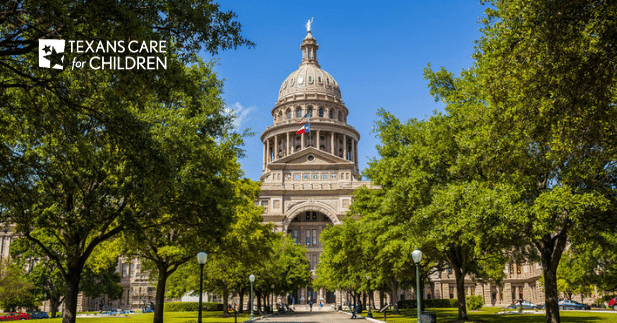
During the legislative session that starts in January 2023, lawmakers will write the state budget for the next two years — but the process is already underway.
Fortunately, the Legislature will have an extra $27 billion to work with, plus another $13.6 billion in the Rainy Day Fund, according to the state Comptroller. That provides state leaders an opportunity to invest in critical priorities at a time when legislators on both sides of the aisle have said that infants, children, moms, and families should be a priority next session.
State agencies recently submitted their budget requests to the Legislative Budget Board (LBB), providing the foundation for writing the first draft of the budget the Legislature will consider. These “Legislative Appropriations Requests,” or LARs, give us a glimpse of the direction state leaders may go in the budget — and the priorities that children’s advocates will champion.
We recently testified to the LBB about several of these budget requests and our recommendations. You can read our detailed testimony to the Department of Family and Protective Services (DFPS), Health and Human Services Commission (HHSC), Texas Education Agency (TEA), and Texas Workforce Commission (TWC).
Here are some of our top takeaways from the budget requests.
We agree with the following requests from state agencies and urge the Legislature to support them.
- Funding to ensure state agencies have an adequate workforce (included in several agencies’ budget requests): A number of state agencies made clear in their written requests and in their public comments that addressing their workforce challenges, through pay raises and other steps, must be a priority. As we recently wrote in our blog , there are multiple strategies that policymakers should pursue on this front.
- Funding for a functional enrollment and eligibility system for Medicaid and other services (HHSC budget request): The enrollment and eligibility system for Medicaid and other programs is facing significant difficulties even as applications and renewals remain low under pandemic Public Health Emergency (PHE) policies. Parents are having difficulty enrolling eligible children, a priority identified by the Speaker of the House, and Texas must be prepared to quickly process Medicaid renewals when the PHE ends. To tackle these challenges, we support HHSC’s request for additional funding to address HHSC workforce needs, maintain public-facing offices, and improve technology (Exceptional Item requests #2, #18, and #19).
- Funding for child abuse and neglect prevention (DFPS budget request): We greatly appreciate DFPS requesting an additional $90 million for Texas programs designed – and proven – to prevent child maltreatment and support positive youth development. These Prevention and Child Well-being (PCW) programs support pregnant and parenting youth in foster care, keep youth safe at home and out of the juvenile justice system, and help families with infants and toddlers who want additional support.
We agree with the following requests from state agencies — but the Legislature needs to go further.
- Funding for Early Childhood Intervention (ECI) to serve infants and toddlers with disabilities (HHSC budget request): Demand for ECI continues to grow, resulting in decreased funding per child, as the budget request warns. We support the Exceptional Item #11 request to increase ECI funding, but the Legislature needs to provide additional funding beyond that request in order to keep up with demand. (Read more in our ECI coalition testimony.)
- Funding to place kids with grandparents or other “kinship” care instead of strangers in foster care (DFPS budget request): DFPS requested an additional $6.9 million for kinship care, recognizing the many benefits of placing children with relatives instead of strangers, but additional funding will be needed.
- Funding to maintain and improve access to high-quality child care (TWC budget request): We support the Texas Workforces Commission’s Exceptional Items that will allow Texas to draw down federal child care funding, but we believe Texas must invest more. The Legislature should provide bedrock state funding to help offset programs’ fixed costs, including educator wages, and increase the number of high-quality child care providers, especially in designated child care deserts.
We’re disappointed the budget requests left out increased funding for other priorities — especially children’s mental health.
- Additional funding for student mental health (missing from TEA budget request): There has been a growing student mental health crisis over the last decade, spurring state leaders to speak out this year about the importance of policymakers taking action. Yet the TEA budget request does not include a request for additional funding (through an Exceptional Item request) to address this crisis. We urge the Legislature to create a Mental Health Allotment to provide dedicated student mental health funding to school districts.
- Additional funding for Local Mental Health Authorities and Local Behavioral Health Authorities to serve children (missing from HHSC budget request): As parents struggle to find mental health support for their children, we’re disappointed the HHSC budget request did not include an Exceptional Item request to address critical capacity needs within these community mental health providers. The Legislature should add funding to the budget so LMHAs/LBHAs can keep up with the demand for life-changing — and life-saving — services they provide.
- State investments for family preservation services under the Family First Act (missing from DFPS budget request): To help keep children safely with their families and out of foster care, Texas should begin to use Family First Prevention Services Act (FFPSA) Title IV-E funds to support ongoing or new family preservation efforts. To achieve this goal and draw down federal Title IV-E funds, Texas needs to make state investments in evidence-based services to keep families together, including mental health, substance use treatment, and parenting skill building for children or their caregivers.
We also urge budget writers to include funding for other health care priorities identified by legislative leaders.
- Funding for 12 months of health coverage for moms after pregnancy (missing from HHSC budget request): Legislators on both sides of the aisle have said they will prioritize this legislation during the upcoming session. It will be important to include funding in the budget for implementation.
- Funding to revitalize the state’s marketing and outreach efforts for Medicaid health insurance and other programs (missing from HHSC budget request): Speaker of the House Dade Phelan has called for improved efforts to help eligible children enroll in health coverage. Part of the strategy will be removing unintended barriers and delays in the enrollment system, as discussed above, and part of the strategy should be improved outreach efforts.
We recognize these budget requests from state agencies are just the first step in developing the state budget. We look forward to working with legislators and partners to ensure that the next state budget includes the priorities described above in order to meet the needs of Texas kids.



